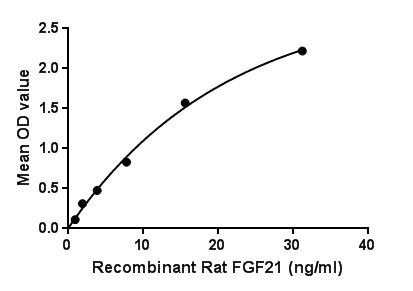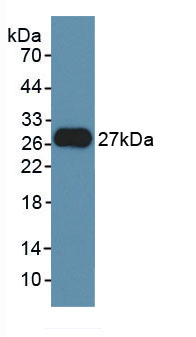
Details
ACTIVITY TEST
Buffer Formulation 100mMNaHCO3, 500mMNaCl, pH8.3, containing 1mM EDTA, 1mM DTT, 0.01% SKL, 5% Trehalose and Proclin300. Traits Freeze-dried powder Purity > 90% Isoelectric Point 5.6 Applications Cell culture; Activity Assays.

Figure. The binding activity of FGF21 with FGFR1.
Fibroblast growth factor 21 (FGF21) is a member of the fibroblast growth factor (FGF) family and specifically a member of the endocrine subfamily which includes FGF23 and FGF15/19. FGF family members possess broad mitogenic and cell survival activities and are involved in a variety of biological processes including embryonic development, cell growth, morphogenesis, tissue repair, tumor growth and invasion. FGF21 action through one of the FGF21 receptors thus requires interaction with a co-receptor, designated β-klotho. Besides, Fibroblast Growth Factor Receptor 1 (FGFR1) has been identified as an interactor of FGF21, thus a binding ELISA assay was conducted to detect the interaction of recombinant rat FGF21 and recombinant rat FGFR1. Briefly, FGF21 were diluted serially in PBS, with 0.01% BSA (pH 7.4). Duplicate samples of 100μL were then transferred to FGFR1-coated microtiter wells and incubated for 2h at 37℃. Wells were washed with PBST and incubated for 1h with anti-FGF21 pAb, then aspirated and washed 3 times. After incubation with HRP labelled secondary antibody, wells were aspirated and washed 3 times. With the addition of substrate solution, wells were incubated 15-25 minutes at 37℃. Finally, add 50µL stop solution to the wells and read at 450nm immediately. The binding activity of FGF21 and FGFR1 was shown in Figure 1, and this effect was in a dose dependent manner.USAGE
Reconstitute in 100mM NaHCO3, 500mM NaCl (pH8.3) to a concentration of 0.1-1.0 mg/mL. Do not vortex.
STORAGE
Avoid repeated freeze/thaw cycles. Store at 2-8°C for one month. Aliquot and store at -80°C for 12 months.
STABILITY
The thermal stability is described by the loss rate. The loss rate was determined by accelerated thermal degradation test, that is, incubate the protein at 37°C for 48h, and no obvious degradation and precipitation were observed. The loss rate is less than 5% within the expiration date under appropriate storage condition.
Image

Figure. SDS-PAGE

Figure. Western Blot
Partial purchase records(bought amounts latest0)
User Comment(Total0User Comment Num)
- No comment


 +86 571 56623320
+86 571 56623320




